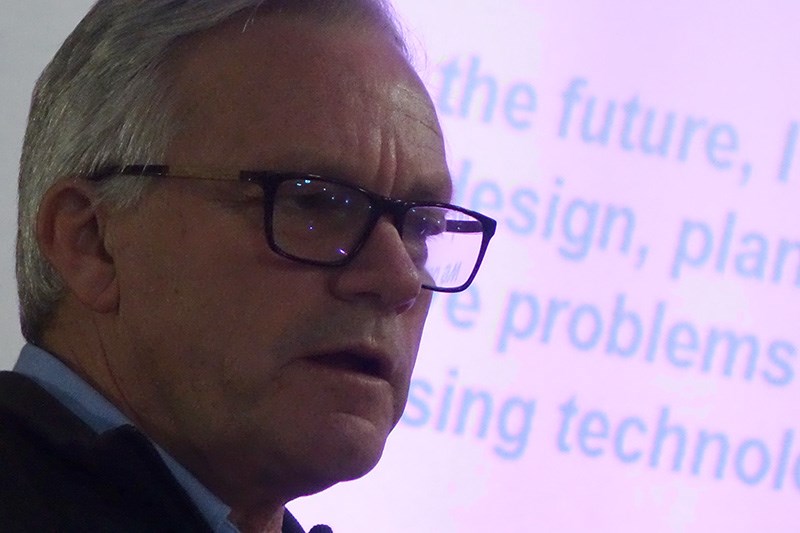Increasing demand for battery-powered vehicles could be the key to increased demand and prices for nickel, Vale’s director of North Atlantic mining operations told Thompson Chamber of Commerce members Oct. 3 while he was in town for Manitoba Operations’ annual open house.
But achieving price stability is a key to convincing the company’s board to invest in further developing Thompson’s mines to take advantage of that growing market, said Alistair Ross.
“We believe that society is on a path that they will not deflect from at least in the next 10 to 20 years and that is we’re not going to continue with internal combustion engines,” Ross said. “The answer to no more ICE – internal combustion engines – is battery electric.”
As battery technology has changed, nickel has become a more important component in their manufacturing.
“People found that when you added nickel to lithium batteries, the capacity of them grew and the ability to charge and recharge grew too,” Ross said. “Everybody’s talking about lithium ion batteries as the future. These batteries here have eight parts nickel to one part of lithium. That is a lot of nickel.”
Ross said that part of the reason that Manitoba Operations had to switch from an integrated operation to one focused solely on mining and milling, in addition to stricter environmental regulations, was the outdated technology in the smelter and refinery that made production costs higher.
“Even before the closure if you look across all of the old Inco and new Vale base metals, Thompson’s labour costs per pound of nickel were always one of the worst,” said Ross. “We couldn’t do enough to save the old technology in the refinery and smelter. We did not find an economically viable way to keep that technology going.”
On the brighter side, he said that Thompson has a very capable workforce and geological potential.
“If you were to look across the world for an area that had nickel that could be invested in on a standalone nickel basis, there isn’t a better place,” he said.
That said, the next two years will be critical for Vale’s board to be convinced that investing money here is a wise move.
“Our critical path to ensure that the board has the faith that this is the right place to put the money in Thompson is very clear to me,” he said. “It’s the next two years of how we perform. Once you’ve got that stability and you become that safe bet, everything else is lining up for us. The way that the market’s going, the fact that we have the geological endowment, the fact that we’ve got the technology to find that. If we can show that we are capable day after day of reliably converting nickel in the ground to nickel to the market, I believe … money can flow.”
Right now, Ross said, outdated underground infrastructure is hampering the ability of workers to produce nickel ore at the level that will likely be required in the future if battery-powered vehicles take off, which could double the market for specialty nickel from two million tons to four million tons per year within the next decade.
“There will be a supply crunch for sure,” he said.
The company’s Manitoba division wants to spend as much as $5 million on exploration this year, up from about $2 million last year.
Ross also said there is potential in the future that battery companies will look at locating manufacturing facilities closer to the sources of nickel, because nickel can be expensive to transport.
Following his presentation, Ross answered questions about whether companies would be seeking to secure nickel sources in the future, which he thought they would, and whether the company’s board would really be willing to invest in base metals since they only make up a small part of its overall business.
“It is our belief that we can be a very significant premium supplier [of specialty nickel products],” said Ross, who believes the premiums companies will pay in the future will be higher than those they currently pay for high-quality nickel. “We believe that’s what will sway the board to put the money here because it’s going to be a such a good return on investment.”
He also said that it appears nickel will remain part of battery technology in the long run, though nothing is ever for sure.
“It doesn’t seem to be much of a shift from nickel because it was such a big advantage when nickel came on,” Ross said. “Maybe somebody will find something better than nickel, who knows?”
How much production can be ramped up in Thompson and elsewhere will also depend on the market. Nickel was trading at between $11,000 and $12,000 per ton on the day he was speaking and he believes a price of at least $14,000 to $15,000 will be necessary to justify developing new ore sources.




